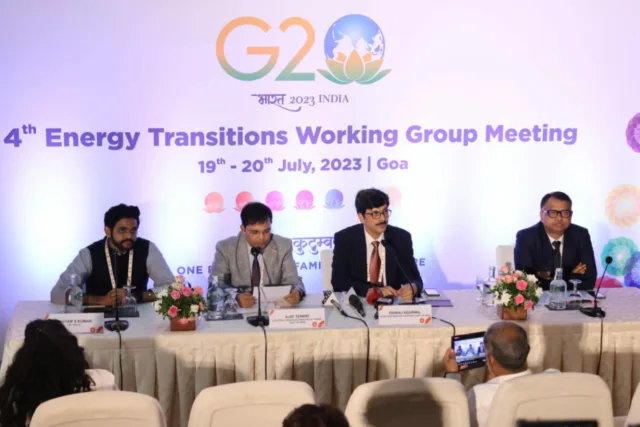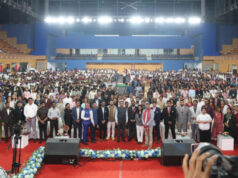The 4th and last Energy Transitions Working Group Meeting, held under India’s G20 presidency, came to a successful conclusion in Goa today. The two-day meeting witnessed proactive engagement from over 115 delegates representing G20 member countries and nine invitee countries.
The discussions centered around critical challenges related to climate change, sustainability, energy security, equitable energy access and financing, in the context of global energy transitions. The meeting emphasized the urgent need for feasible, collaborative, and accountable policy actions to accelerate global energy transitions while ensuring universal energy access and just, affordable, and inclusive energy transitions in line with achieving Sustainable Development Goals (SDGs).
As the meeting drew to a close, Secretary, Ministry of Power, Government of India, Pankaj Agarwal; Additional Secretary, Ministry of Power, Government of India, Ajay Tewari; and Joint Secretary, Ministry of New & Renewable Energy, Government of India, Dinesh Jagdale addressed a press conference to brief the media and the larger public about the outcomes of the meeting and the way forward.
Expressing his gratitude to all participants, the Union Power Secretary, Pankaj Agarwal highlighted the insightful contributions made during the meeting. “Our decision and collaborative endeavors at this juncture will drive the energy panorama for future times.”
The Secretary informed that there has been significant convergence on hydrogen-related issues and that the working group has taken note of Green Hydrogen Innovation Centre proposed by India and the Global Biofuel Alliance which is proposed to be launched by India. “There has been substantive meeting of minds on low-cost financing for energy transition. The Working Group has taken note of the voluntary action plan proposed by India for doubling of pace of energy efficiency by the year 2030.”
The Power Secretary said that significant progress was made in the working group meeting, as members arrived at a consensus on many incremental proposals put forth by the Indian Presidency. Efforts are ongoing to negotiate further on remaining points, he added.
Affordable access to power and clean energy solutions was identified as a growing necessity, along with safeguarding the supply chains of critical materials to foster a more sustainable clean energy transition.
The outcome of the working group meeting will be presented to the Energy Ministers for the declaration during the Energy Transitions Ministerial Meeting scheduled for 22nd July. The Secretary expressed optimism on reaching a balanced consensus among all G20 members to support and collaborate in accelerating Energy Transition.
Additional Secretary, Ministry of Power, Government of India, Ajay Tewari said that 28 countries are participating in the discussion. There is already been consensus on various issues. All paragraphs of energy efficiency have been agreed upon. Voluntary Action Plan on doubling pace of energy efficiency by 2030 has been agreed upon. “The importance of developing and widely adopting both existing and emerging clean technologies was underscored, including Carbon Capture Utilization and Storage (CCUS), Green and Low Carbon hydrogen and its derivatives, biofuels, Small and Modular Reactors (SMRs), among others. Participants recognized that technology cooperation and collaborative investment are vital to advance these initiatives successfully. We hope to arrive at something positive on green hydrogen consensus as well.”
The Indian presidency-led Energy Transitions Working Group will feature the release of 13 global studies focusing on advancing energy transitions, providing valuable insights and guidance for collective efforts in achieving transition goals. Out of these, eight studies have already been released and the remaining five will be released during the coming days. The studies included topics such as low-cost finance for energy transition, renewable energy supply chain, vulnerability of supply chain of oil and gas energy sources, role of transnational grid interconnections, doubling pace of energy efficiency, importance of biofuels in energy mix, global best practices for just transition in coal sector and critical role of small and modular reactors in energy transition.
The working group successfully organised 15 side events during the meeting, attracting more than 2,000 participants. Two more side events are planned over the next two days leading up to the Ministerial Meeting.






